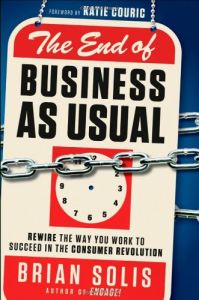Únase a getAbstract para acceder al resumen.

Únase a getAbstract para acceder al resumen.
Brian Solis
The End of Business as Usual
Rewire the Way You Work to Succeed in the Consumer Revolution
Wiley, 2011
¿De qué se trata?
Businesses that fail to adapt to the digital revolution will become obsolete. Here’s how to stay ahead.
Recommendation
Before the Internet and social media, consumers who didn’t like a store told a few friends, sent an angry letter or just never bought there again. Businesses had the power. Today, unhappy shoppers complain on social media and potentially can do great harm. Companies must wake up to the power of connected consumers. One top US airline describes itself as “customer-centric,” but a word cloud depicting its customers’ online conversations in a graphic shows the most popular terms include: “worst, fail, hate, delay, waiting, awful, cancelled and nightmare.” That can be ruinous. Companies must engage proactively with their online audiences, and their audience’s audiences, to protect their reputations. Best-selling author, digital analyst and futurist Brian Solis explains how. His comprehensive report helps new and veteran corporate leaders understand the digital revolution, and suggests tactics for exploiting this radical transformation. getAbstract recommends Solis’s far-reaching overview to executives and entrepreneurs looking to leverage social media and the web.
Summary
About the Author
Digital analyst and futurist Brian Solis reports on disruptive technology and its impact on business and society. His bestsellers include What’s the Future of Business?


























Comment on this summary